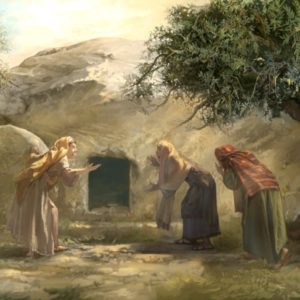CAN WE TRUST JOHN? Part 3
 There are five crucial questions to ask when considering the reliability of John’s gospel. So far we have asked Who wrote it? When was it written? Did the author mean to be truthful and did he succeed? This week we ask Is there more than one kind of truth?
There are five crucial questions to ask when considering the reliability of John’s gospel. So far we have asked Who wrote it? When was it written? Did the author mean to be truthful and did he succeed? This week we ask Is there more than one kind of truth?
I start with the idea that in John we are dealing with two things: with historical truth -what actually happened; and also with theological truth – what is the hidden and eternal meaning of these events.
The first four chapters of John are relatively straightforward. It starts off with theology, ‘In the beginning was the Word…’ (1.1-18) alternating it with accounts of John the Baptist in 1.6 & 15. Then follow various conversation: “Rabbi, where are you staying?” “Come and see” (1.38-39), the wedding at Cana, the cleansing of the Temple and the talk with Nicodemus. I think that 3.13-21 is another theological passage: ‘God so loved the world that he gave his only Son …’ (3.16). This is followed by the conversation with the Samaritan woman in chapter 4 and two healing miracles. The history and the theology are in conversation with each other, but are distinguishable.
From 5.19 things start to get a bit messy. In chapters 5, 6, 7, 8, 10 and 12 there are long speeches by Jesus, which are quite unlike the teachings recorded in the other three gospels.
Though not completely unlike. ‘The son can do nothing on his own, but only what he sees his father doing…” (5.19) is echoed in ‘Q’ saying, a written source recorded in Matthew and Luke: ‘All things have been handed over to me by my Father, and no one knows who the Son is except the Father, or who the Father is except the Son and anyone to who the Son chooses to reveal him.’ (Matthew 11.27, Luke 10.22) Verses 19-47 of chapter 5 seems to be an expansion and exploration of the truth of that first saying. But by whom? by Jesus? by the Evangelist putting it into the mouth of Jesus?
There is one striking difference between John and the three other gospels. The other three all have Jesus’ ministry take place in Galilee. Indeed, I once sat outside the church of the Beatitudes overlooking the Sea of Tiberias and read the first 10 chapters of Mark. I could trace almost all of Jesus movements from that sole vantage point. But in John, all the discourses and debates with the Jews, apart from chapter 6, take place in Jerusalem. The other gospels record just one Passover in Jerusalem. John records three Passovers, and three other festivals, (though I personally think that the Passover in chapter 2 has been misplaced). When people say that Jesus’ ministry lasted three years, they are taking their chronology from John.
This may partly explain the apparent anti-Jewish bias in John. The original meaning of the word ‘Jew’ is ‘Judaean’, i.e. someone from the southern part of Palestine around Jerusalem. Even in chapter 6 Jews do not appear to dispute with Jesus until verse 41 when he is back at the Capernaum synagogue. So the anti-Jewish statements like “You are from your father the devil and you choose to do your father’s desires,’ (10.44) could reflect tension between Jesus the Galilean and the Judaean establishment; or it could reflect the later tension between the early church and rabbinic Judaism; or both.
Most of the great “I AM” statements take place in Jerusalem: I AM the light of the world (8.12), I AM (8.59), I AM the gate for the sheep (10.7), I AM the good shepherd (10.11), I AM the resurrection and the life (11.25), I AM the way and the truth and the life (14.6), I AM the true vine (15.1). The only exception is I AM the bread of life (6.35) which takes place after the feeding of the 5,000.
Nowhere in the synoptics does Jesus make claims like this, except when on trial for his life before the high priest (Mark 14.62). Before that, he is always telling people to keep quiet about him. When he is challenged specifically about the authority which which he expelled traders from the temple, he responds with a question the Pharisees find it more politic not to answer, and replies, “Neither will I tell you by what authority I am doing these things.” (Mark 11.33). Even when Peter states “You are the Messiah.” he does not say, “You’re right”, he tells them to be quiet. (Mark 8.29-10) So: either Jesus spoke and acted in a very different way in Judaea from when in Galilee, or these are made up accounts, perhaps similar to the made-up speeches which the Roman historian Livy put into the mouths of characters in his histories.
But the words have an authority of their own. When Jesus says, “I and the Father are one,” I don’t believe the actual words were so spoken. But they carry a note of authority, an insight into the inner life of Jesus, which perhaps only the ‘disciple whom Jesus loved’ could express as he lived through the crucifixion and resurrection and lived daily in the power of the Spirit. As he heard his risen Lord speak to him day by day, out of his past recollections and his present experience, he fashioned the book we call the gospel of John, ‘so that you may come to believe that Jesus is the Christ, the Son of God, and that through believing you may have life in his name.’ (20.31)
